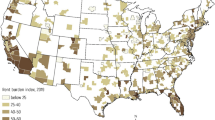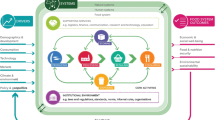Abstract
Much of the literature on urban food systems has focused on supermarket expansion and their ability to reach urban consumers. However, the current pace of urbanisation and rising urban poverty has been accompanied by a major upsurge in informality and a growing role for the informal food sector. One of the persistent arguments in the supermarkets literature is that the expansion of modern retail undermines the informal food sector. Critics of this argument suggest that there are two conditions under which this may not occur: first, when there is spatial differentiation with supermarkets servicing higher income areas and the informal sector targeting low-income areas. And second, when there is market segmentation when the formal and informal sectors focus on the sale of different product types. This paper examines the case of Windhoek, Namibia, which has undergone a major supermarket revolution in the last two decades. It suggests that the informal food sector is vibrant and growing but that neither explanation fully accounts for its resilience and survival. Instead, by examining the strategies of vendors, it suggests the concept of cohabitation as an alternative explanation. Cohabitation may be a pertinent factor in other supermarket cities as well.


Similar content being viewed by others
References
Abrahams, C. (2007). Globally useful conceptions of alternate food networks in the global south: the case of Johannesburg’s urban food supply system. In D. Maye, L. Holloway, & M. Kneafsey (Eds.), Alternative food geographies: representation and practice (pp. 95–114). Amsterdam: Elsevier.
Abrahams, C. (2010). Transforming the region: supermarkets and the local food economy. African Affairs, 109, 115–134.
Abrahams, C. (2011). Supermarkets and urban value chains: rethinking the developmental mandate. Food Chain, 1, 206–222.
Altenberg, T., Kulke, E., Hampel-Milagrosa, A., Peterskovsky, L., & Reeg, C. (2016). Making retail modernisation in developing countries inclusive: a development policy perspective (discussion paper 2/2016). Bonn: German Development Institute.
Amwele, H. (2013). An empirical investigation into the factors affecting the performance of SMEs in the retail sector in Windhoek, Namibia. MIB Thesis, Polytechnic of Namibia, Windhoek.
Banwell, C., Dixon, J., Seubsman, S.-A., Pangsap, S., Kelly, M., & Sleigh, A. (2012). Evolving food retail environments in Thailand and implications for the health and nutrition transition. Public Health Nutrition, 16, 608–615.
Battersby, J., & Peyton, S. (2016). The spatial logic of supermarket expansion and food access. In J. Crush & J. Battersby (Eds.), Rapid urbanisation, urban food deserts and food security in Africa (pp. 33–46). Dordrecht: Springer.
Battersby, J., & Watson, V. (Eds.). (2019). Urban food systems governance and poverty in African cities. London: Routledge.
Battersby, J., Marshak, M., & Mngqibisa, N. (2016). Mapping the informal food economy in Cape Town, South Africa (HCP discussion paper no. 5). Cape Town: Hungry Cities Partnership.
Berger, M., & van Helvoirt, B. (2018). Ensuring food secure cities: retail modernization and policy implications in Nairobi, Kenya. Food Policy, 79, 12–22.
Caesar, M., & Crush, J. (2016). Food access and insecurity in a supermarket city. In J. Crush & J. Battersby (Eds.), Rapid urbanisation, urban food deserts and food security in Africa (pp. 47–58). Dordrecht: Springer.
Crush, J., & Battersby, J. (Eds.). (2016). Rapid urbanization, urban food deserts and food security in Africa. Dordrecht: Springer.
Crush, J., & Frayne, B. (2018). The ‘supermarketization’ of food supply and retail: private sector interests and household food security. In B. Frayne, J. Crush, & C. McCordic (Eds.), Food and nutrition security in southern African cities (pp. 168–197). London: Routledge.
Crush, J., & McCordic, C. (2017). The hungry cities food purchases matrix: household food sourcing and food system interaction. Urban Forum, 28, 421–433.
Crush, J., Skinner, C., & Stulgaitis, M. (2017). Benign neglect or active destruction? A critical analysis of refugee and informal sector policy and practice in South Africa. African Human Mobility Review, 3, 751–782.
Crush, J., Nickanor, N., & Kazembe, L. (2019). Informal food deserts and household food insecurity in Windhoek, Namibia. Sustainability, 11(1), 37.
Dakora, E. (2012). Exploring the fourth wave of supermarket evolution: concepts of value and complexity in Africa. International Journal of Managing Value and Supply Chains, 3, 25–37.
Emongor, R. (2009). The impact of South African supermarkets on agricultural and industrial development in the Southern African development community. PhD Thesis, University of Pretoria, Pretoria.
Farina, E., Nunes, R., & Monteiro, G. (2005). Supermarkets and their impacts on the agrifood system of Brazil: the competition among retailers. Agribusiness, 21, 133–147.
Frayne, B. (2005). Rural productivity and urban survival in Namibia: Eating away from home. Journal of Contemporary African Studies 23(1), 51-76
Frayne, B., Crush, J., & McCordic, C. (Eds.). (2018). Food and nutrition security in southern African cities. London: Routledge.
Gorton, M., Sauer, J., & Supatpongkul, P. (2011). Wet markets, supermarkets and the ‘big middle’ for food retailing in developing countries: evidence from Thailand. World Development, 39, 1624–1637.
Government of Namibia (2017). Namibia informal economy: case study report 2016/17. Windhoek: Ministry of Labour, Industrial Relations and Employment Creation, and Social Security Commission.
Huang, C., Tsai, K., & Chen, Y. (2015). How do wet markets still survive in Taiwan? British Food Journal, 117, 234–256.
Humphrey, J. (2007). The supermarket revolution in developing countries: tidal wave or tough competitive struggle? Journal of Economic Geography, 7, 433–450.
Kambwale, J., Chisoro, C., & Karodia, J. (2015). Investigation into the causes of small and medium enterprise failures in Windhoek, Namibia. Arabian Journal of Business and Management Review, 4, 80–109.
Kelly, M., Seubsman, S.-A., Banwell, C., Dixon, J., & Sleigh, A. (2015). Traditional, modern or mixed? Perspectives on social, economic, and health impacts of evolving food retail in Thailand. Agriculture and Human Values, 32, 445–460.
Kennedy, G., Nantel, G., & Shetty, P. (2004). Globalization of food systems in developing countries: a synthesis of country case studies (food and nutrition paper 83). Rome: FAO.
Louw, A., Chikazunga, D., Jordaan, D., & Biénabe, E. (2007). Restructuring food markets in South Africa: dynamics within the context of the tomato subsector (Agrifood sector studies, Regoverning markets project). Pretoria: University of Pretoria.
Madevu, H., Louw, A., & Kirsten, J. (2007). Mapping the competitive food chain for fresh produce: the case of retailers in Tshwane Metro, South Africa. International Food and Agribusiness Management Association 17th Annual World Symposium, Parma, June.
Miller, D. (2008). Food frontiers in Zambia: resistance and partnership in Shoprite’s retail empire. At Issue ezine, 3, July 2008.
Minten, B. (2008). The food retail revolution in poor countries: is it coming or is it over? Economic Development and Cultural Change, 56, 767–789.
Minten, B., & Reardon, T. (2008). Food prices, quality, and quality’s pricing in supermarkets versus traditional markets in developing countries. Review of Agricultural Economics, 30, 480–490.
Minten, B., Reardon, T., & Sutradhar, R. (2010). Food prices and modern retail: the case of Delhi. World Development, 38, 1775–1787.
Nickanor, N. (2014). Food deserts and household food insecurity in the informal settlements of Windhoek, Namibia. PhD thesis, University of Cape Town, Cape Town.
Nickanor, N., Kazembe, L., Crush, J., & Wagner, J. (2017). The supermarket revolution and food security in Namibia (urban food security series no. 26). Cape Town: AFSUN.
NSA (Namibia Statistics Agency) (2017). The Namibia labour force survey 2016 report, Windhoek: Namibia Statistics Agency.
Peyton, S., Moseley, W., & Battersby, J. (2015). Implications of supermarket expansion on urban food security in Cape Town, South Africa. African Geographical Review 34, 36-54.
Reardon, T., & Berdegué, J. (2002). The rapid rise of supermarkets in Latin America: challenges and opportunities for development. Development Policy Review, 20, 371–388.
Reardon, T., & Gulati, A. (2008). The rise of supermarkets and their development implications (Discussion paper 00752). New Delhi: IFPRI.
Reardon, T., & Hopkins, R. (2006). The supermarket revolution in developing countries: policies to address emerging tensions among supermarkets, suppliers and traditional retailers. European Journal of Development Research, 18, 522–545.
Reardon, T., Timmer, C., Barrett, C., & Berdegué, J. (2003). The rise of supermarkets in Africa, Asia, and Latin America. American Journal of Agricultural Economics, 85, 1140–1146.
Reardon, T., Timmer, P., & Berdegué, J. (2004). The rapid rise of supermarkets in developing countries: induced organizational, institutional and technological change in agrifood systems. Electronic Journal of Agricultural and Development Economics, 1, 168–183.
Schipmann, C., & Qaim, M. (2011). Modern food retailers and traditional markets in developing countries: comparing quality, prices, and competition strategies in Thailand. Applied Economic Perspectives and Policy, 33, 345–362.
Seibes-Bock, B. (2004). A study of social constraints and economic survival strategies of female heads of households operating in the informal sector of Katatura, Windhoek, Namibia. MA thesis, University of Western Cape, Cape Town.
Si, Z., Scott, S., & McCordic, C. (2016). Supermarkets, wet markets and food patronage in Nanjing, China (HCP discussion paper no. 4). Cape Town: Hungry Cities Partnership.
Skinner, C. (2019). Contributing and yet excluded? Informal food retail in African cities. In J. Battersby & V. Watson (Eds.), Urban food systems governance and poverty in African cities. London: Routledge.
Skinner, C., & Haysom, G. (2017). The informal sector’s role in food security: a missing link in policy debates? (HCP discussion paper no. 6). Cape Town: Hungry Cities Partnership.
Skinner, C., & Watson, V. (2018). The informal economy in cities of the global south: challenges to the planning lexicon. In G. Bhan, S. Srinivas, & V. Watson (Eds.), The Routledge companion to planning in the global south (pp. 140–152). London: Routledge.
Suryadarma, D., Poesoro, A., Akhmadi, Budiyati, S., Rosfadhila, M., & Suryahadi, A. (2010). Traditional food traders in developing countries and competition from supermarkets. Evidence from Indonesia. Food Policy, 35, 79–86.
Tacoli, C. (2017). Food (in) security in rapidly urbanizing, low-income contexts. International Journal of Environmental Research and Public Health, 14, 1554. https://doi.org/10.3390/ijerph14121554.
Vink, N. (2013). Commercialising agriculture in Africa: economic, social, and environmental impacts. African Journal of Agricultural and Resources Economics, 9, 1–17.
Weatherspoon, D., & Reardon, T. (2003). The rise of supermarkets in Africa: implications for agri-food systems and the rural poor. Development Policy Review, 21, 333–355.
Funding
The survey discussed in this paper was funded by the Open Society Foundation and the Hungry Cities Partnership with support from the Social Sciences and Humanities Research Council of Canada (SSHRC) and the International Development Research Centre (IDRC) International Partnerships for Sustainable Societies (IPaSS) Program. The writing of the paper was made possible by a grant from the Queen Elizabeth Diamond Jubilee Advanced Scholars program.
Author information
Authors and Affiliations
Corresponding author
Additional information
Publisher’s Note
Springer Nature remains neutral with regard to jurisdictional claims in published maps and institutional affiliations.
Rights and permissions
About this article
Cite this article
Nickanor, N., Crush, J. & Kazembe, L. The Informal Food Sector and Cohabitation with Supermarkets in Windhoek, Namibia. Urban Forum 30, 425–442 (2019). https://doi.org/10.1007/s12132-019-09369-1
Published:
Issue Date:
DOI: https://doi.org/10.1007/s12132-019-09369-1




